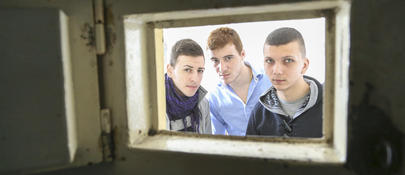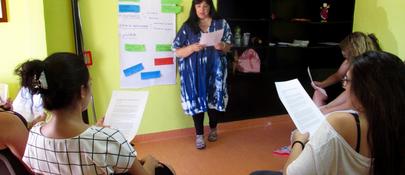
The Challenge
Violence directed against people because of their gender is the most severe form of discrimination and remains part of everyday life for too many living in Europe today. A Europe wide survey conducted by FRA indicates that one third of women have experienced physical violence during their adult lives.
Lack of awareness
Too often, awareness raising campaigns focus on providing victims with information and assistance, rather than targeting the root causes of domestic and gender-based violence, particularly those related to gender stereotyping and cultural norms.
Limited and insufficient protection
In some cases, public authorities lack the necessary capacities to ensure a sufficient level of protection to the victims, especially against emerging forms of violence such as online harassment, stalking and bullying.
Inadequate and disconnected policies
Judges, prosecutors, and health care and education personnel working with domestic and gender-based violence are often untrained or unspecialised in the field. Research in the area is also limited, but points at policy gaps and rigid structures unable to cope with new forms of violence.
Underreporting of violence
Physical or sexual violence are forms of crime that people do not easily report, something partially influenced by social and cultural norms. Distrust of the police, fear of revenge of the perpetrator, or shame or fear of worsening the situation are other common factors.
Our Approach
Our goal
We aim to prevent domestic and gender-based violence and protect and assist the victims.
How?
Gender-based violence is a violation of fundamental rights that goes beyond the remits of criminal law and touches upon many policy fields from public health to education. Our support in this area therefore covers various initiatives, such as:
- Development of legislation, policies and strategies at the national level to prevent and tackle gender-based violence, including the development of effective protective measures;
- Advocacy, awareness-raising, and capacity building activities on gender-based and sexual harassment (including online harassment);
- Development of effective and integrated response systems that bring together police, justice, health and service agencies;
- Training of professionals in close contact with victims and/or offenders;
- Specialised support services for victims of gender-based violence and affected children, creating – when possible – partnerships between different levels of government and civil society.
Creating partnerships
The Council of Europe is an important partner to the Grants in the area of gender-based violence. The Istanbul Convention, which entered into force on 1 August 2014, serves as a reference and guideline for our efforts. Support will enable beneficiary countries to prepare and follow up the ratification of the Convention. Moreover, the Convention on Action against Trafficking in Human Beings and GRETA’s recommendations provide guidelines for projects. Programmes shall be in line with these Conventions.
In addition, the comprehensive and comparable data made available by the EU Agency for Fundamental Rights (FRA) on the scale and nature of violence against women in Europe serve as an important baseline for our support in this field.
The Norwegian Ministry of Justice and Public Security is a Donor Programme Partner in this area and has established a synergy network between the donor entities, the Council of Europe, and the beneficiary countries. The Ministry can assist Norwegian entities that wish to become partners in projects. Project partnerships include the Norwegian police, the Norwegian Courts Administration, the Norwegian Directorate of Health, the Icelandic Government Agency for Child Protection, and NGOs specialised in fighting domestic and gender-based violence.



